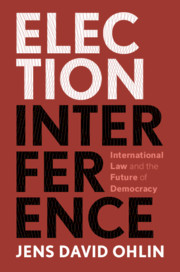Book contents
- Election Interference
- Election Interference
- Copyright page
- Dedication
- Contents
- Acknowledgements
- Introduction
- 1 What Is Election Interference?
- 2 Election Interference Is Not Cyber-War
- 3 Limits of the Sovereignty Framework
- 4 The Promise of Self-Determination
- 5 Foreign Electioneering and Transparency
- 6 Free Speech and Elections
- 7 The Value of Criminal Prosecutions
- 8 Soliciting Foreign Interference
- Conclusion
- Index
2 - Election Interference Is Not Cyber-War
Published online by Cambridge University Press: 09 June 2020
- Election Interference
- Election Interference
- Copyright page
- Dedication
- Contents
- Acknowledgements
- Introduction
- 1 What Is Election Interference?
- 2 Election Interference Is Not Cyber-War
- 3 Limits of the Sovereignty Framework
- 4 The Promise of Self-Determination
- 5 Foreign Electioneering and Transparency
- 6 Free Speech and Elections
- 7 The Value of Criminal Prosecutions
- 8 Soliciting Foreign Interference
- Conclusion
- Index
Summary
Historically, foreign election interference was accomplished through nondigital means. In today’s world, however, these prosaic forms of interference have been replaced with their digital counterparts: the use of email hacking and fraudulent social media presence to influence the public and consequently interference with an election. Because the method of election interference has shifted to the digital domain, there is a strong temptation to view the legality of election interference through the international legal rules governing cyber-attacks. In other words, some would condemn election interference as illegal under international law because it represents a form of cyber-warfare. Other lawyers and politicians will argue the opposite: that election interference does not violate international law because it does not rise to the level of a cyber-war, as if this is the end of the matter in terms of the legal analysis. What unites these two competing conclusions is the assumption that cyber-warfare is the correct framework for judging the legality of election interference. That assumption is profoundly mistaken. This chapter will explain why the assumption is mistaken and why the cyber-war framework is unhelpful.
Keywords
- Type
- Chapter
- Information
- Election InterferenceInternational Law and the Future of Democracy, pp. 40 - 66Publisher: Cambridge University PressPrint publication year: 2020
- 1
- Cited by

